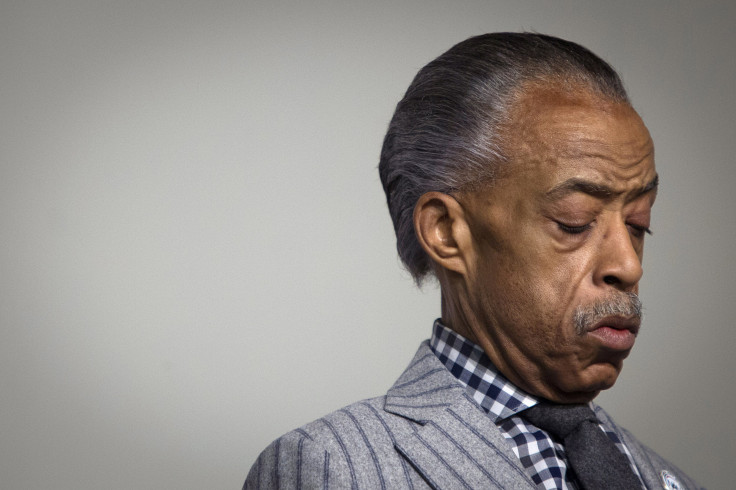Who Is Al Sharpton? Eric Garner, Michael Brown Police Killings Thrust Civil Rights Activist Back In Spotlight

Hours after a New York grand jury decided not to bring charges against a white police officer in the chokehold death of Eric Garner, his wife and mother appeared in the historic black neighborhood of Harlem Wednesday night to rally supporters over their shared rage at what was perceived by many as an unjust outcome. At the family's side was none other than the Rev. Al Sharpton, the famed civil rights activist whose profile has been thrust back into the national spotlight by a handful of recent police killings.
"We are dealing with a national crisis," Sharpton told the cheering crowd in Harlem. "How many people have to die before people understand this is not an illusion? This is a reality that America has got to come to terms with."
The speech was the latest public appearance by Sharpton amid a national debate on police brutality and civil rights for black Americans. That advocacy has reintroduced Sharpton to a new generation of socially conscious Americans. As of Thursday morning, his name was trending on Twitter and other social media sites.
Sharpton grew up in Brooklyn and has largely focused his activism on perceived incidents of police brutality in New York City. He became a national figure in 1987 after he advocated on behalf of 15-year-old Tawana Brawley, who claimed she had been raped by a group of white police officers near New York City. A grand jury eventually opted not to bring indictments after determining that Brawley's claims were a hoax, according to NPR. Sharpton was criticized for overreaching in the case to raise his own profile.
His career has been mired by other controversies. He was indicted for tax evasion and fraud and was once stabbed by a white man while leading a march. He notably broke ranks with other African-American religious leaders to support gay marriage and denounce homophobia. His critics often accuse him of being a self-serving, race-monger who has used his national platform to raise money for his civil rights organization, the National Action Network. In 2004, he ran unsuccessfully for president.
From the start, his profile grew with the help of some famous friends. Shortly after meeting civil rights leader Jesse Jackson as a teenager, the older black activist named the a 15-year-old Sharpton New York City youth director for his economic-development program, Operation Breadbasket, according to Newsweek. Sharpton also became close friends with Teddy Brown, the eldest son of soul singer James Brown. After Teddy died in a car crash in 1973, Sharpton became a surrogate son to Brown, as well as his personal aide and road manager.
Sharpton has spent recent years winning over younger civil rights supporters after the fatal shooting of Trayvon Martin in Florida led to a national debate on the state's "Stand Your Ground" self-defense law. Sharpton also took on the police killings this summer of Garner in Staten Island and Michael Brown in Ferguson, Missouri.
The widow and mother of Eric Garner join me w/ Gayle King on CBS Morning at 8 am est.
— Reverend Al Sharpton (@TheRevAl) December 4, 2014More recently, he was invited to the White House when President Barack Obama announced his nomination of Loretta E. Lynch, the United States attorney for the Eastern District of New York, as the next attorney general, according to the New York Times. It was a reminder of the complicated relationship politicians seem to have with Sharpton: a mixture of fear, admiration, respect and loathing. He's rumored to enjoy a close relationship with Obama and New York City Mayor Bill de Blasio, but has a difficult past with former President Bill Clinton and former Secretary of State Hillary Clinton, according to the New York Times. “We’ve agreed and disagreed, but I have a lot of respect for her,” Sharpton has said.
© Copyright IBTimes 2025. All rights reserved.






















